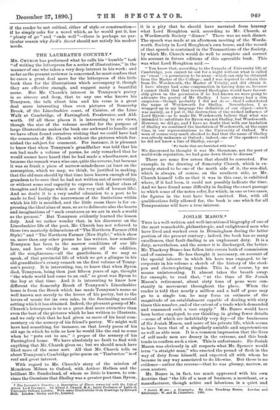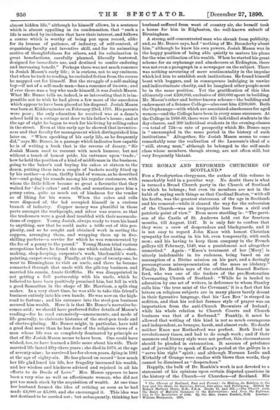JOSIAH MASON.* THIS is a well-written and well-intentioned biography of
one of the most remarkable, philanthropic, and enlightened men who have lived and worked even in Birmingham during the latter portion of the present century ; indeed, the book has so many excellences, that fault-finding is an unpleasant duty. It is a duty, nevertheless, and the sooner it is discharged, the better. Mr. Thackra,y Bunce has fallen into errors both of commission and of omission. He has thought it necessary, on account of the special labours in which his hero was engaged, to in- corporate in his volume a sketch of the history of the steel- pen and electro-plating trades. This is, of course, by no means uninteresting. It almost takes the breath away, for example, to read that, " at the time of Sir Josiah Mason's retirement, about sixty tons of pens were con- stantly in movement throughout the place. When the reader is told that nearly a million and a half of pens may go to a single ton, he may form an estimate of the magnitude of an establishment capable of dealing with sixty times this number, and of the extent of a trade which demanded and consumed such a vast supply." Mr. Bunce would have been better employed, to our thinking, in giving fewer details —some of which are indubitably very dry—of the businesses of Sir Josiah Mason, and more of his private life, which seems to have been that of a singularly amiable and unpretentious as well as able man. It is a common impression that the lives of self-made men are dreary in the extreme, and this book tends to confirm such a view. This is unfortunate. Sir Josiah Mason was obviously in all respects what Mr. Spencer would term "a straight man," who exacted the pound of flesh in the way of duty from himself, and expected all with whom he became in any way associated to do likewise. But there is no evidence—rather the reverse—that he was gloomy, narrow, or even austere.
Mr. Bence is, in fact, too much oppressed with his own doctrine that "the life of a man of business, a merchant, or a manufacturer, though active and laborious, is a quiet and
• Josiah M son a Biography. By John Thackray Bunco. London and Edinburgh: W. and IL Chambers. MO.
almost hidden life," although he himself allows, in a sentence which is almost appalling in its condensation, that " such a life is marked by incidents that have their interest, and follows a course which is worthy of being put upon record, alike for its lessons of patience, of industry, of self-control, of organising faculty and inventive skill, and for its animating motive of thoughtfulness for ethers, and its culmination in great benefactions, carefully planned, liberally bestowed, designed for immediate use, and destined to confer enduring and increasing benefit." Perhaps there was not much romance in Josiah Mason's early life ; it is curious, not to say ominous, that when he took to reading, he excluded fiction from the course he mapped out for himself. But the struggle of a self-making boy—if not of a self-made man—has a romance of its own ; and if ever there was a boy who made himself, it was Josiah Mason. What Mr. Bunce tells us, indeed, is so interesting that it is im- possible not to wish he had given a few more of the anecdotes which appear to have been placed at his disposal. Josiah Mason was born at Kidderminster on February 23rd, 1795. His parents were poor ; the only education he received was at a dame's school held in a cottage next door to his father's house ; and at the age of eight he began to work for his living by selling cakes in the street. Even at this early age he showed that inventive- ness and that faculty for management which distinguished him later on. " When speaking of his early life, as he frequently did," says Mr. Bunce, in a passage which indicates how capable he is of writing a book that is the reverse of dreary, " Sir Josiah Mason used to recount with much humour, but not without a touch of honest pride, his entrance upon trade ; ' how he held the position of a kind of middleman in the business, going to the baker's and buying his cakes at sixteen to the dozen, putting them into a couple of baskets neatly fitted up by his mother—a clean, thrifty kind of woman, as he described her—and going his rounds among his regular customers, with whom the little fellow became so great a favourite that they waited for Joe's cakes' and rolls, and sometimes gave him a penny extra, quite as much out of kindness for the vendor as of liking for hie wares. When the cakes and rolls were disposed of, the lad occupied himself in a curious branch of industry. Copper money was plentiful in those parts amongst the workpeople, and silver was scarce, so that the tradesmen were a good deal troubled with their accumula- tions of copper. Young Josiah, always ready to turn his hand to anything, saw that he could make a trifle out of this per- plexity, and so he sought and obtained work in sorting the coppers, arranging them, and wrapping them up in five- shilling packets—a service for which he was remunerated by the fee of a penny to the pound." Young Mason tried various occupations before he found the one which suited him,—shoe- making, shop-keeping, carpenter's work, blacksmith's work, painting, carpet-weaving. Finally, at the age of twenty-one, he went to Birmingham to visit an uncle, and there he became connected through that uncle with the gilt-toy business, and married his cousin, Annie Griffiths. He was disappointed in not getting a full partnership with his uncle, which he believed to have been positively promised him, but fell in with a good Samaritan in the shape of Mr. Harrison, a split-ring maker. In a very short time, he was able to take this friend's business entirely into his own hands. He was now on the high- road to fortune; and his entrance into the steel-pen business secured him wealth. Here it is that Mr. Bunce's narrative be- comes arid ; we should have preferred fuller details of Mason's reading—for he read extensively—amusements, and mode of life generally, to elaborate histories of the steel-pen trade and of electro-plating. Mr. Bunce might, in particular, have told a good deal more than he has done of the religious views of a man whose life was so completely dominated by principle as that of Sir Josiah Mason seems to have been. One could have wished, too, to have learned a little more aboat his wife. Their married life lasted fifty-three years ; she died in 1870, at the age of seventy-nine ; he survived her for eleven years, dying in 1881 at the age of eighty-six. He has placed on record " how much her life gladlened his life, her frugality increased his wealth, and her wisdom and kindness advised and rejoiced in all his efforts to do Deeds of Love." Mrs. Mason appears to have been a very wise as well as affectionate woman, who did not put too much stock by the acquisition of wealth. At one time her husband formed the idea of retiring as soon as he had made £4,000 or £5,000, and she encouraged it. This idea was not destined to be carried out; but subsequently, thinking her
husband suffered from want of country air, she herself took a house for him in Edgbaston, the well-known suburb of Birmingham.
A strong, self-concentrated man who shrank from publicity, and, as Mr. Bunce says, had " nothing of Mr. Bounderby about him," although he knew his own powers, Josiah Mason was in the happy position of being able quietly to mature his plans for the wise utilisation of his wealth. When he started his great scheme for an orphanage and almshouses at Erdington, there was not even a paragraph in a newspaper on the subject. There was nothing savouring of mere sentimentality in the impulse which led him to establish such institutions. He found himself beset with beggars, and in consequence indulging in unwise and indiscriminate charity, and he imagined other people must be in the same position. Yet the gratification of this idea ultimately cost £200,000, exclusive of £60,000 spent in building. Mr. Mason's other and better-known scheme—the building and endowment of a Science College—also cost him £200,000. Both the Orphanage—with which are associated almshouses for aged women—and the College have been in every sense successes. At the College in 1888-89, there were 415 individual students in the day-classes, and 309 individual students in the evening-classes —a total of 724—a rate of prosperity which Mr. Bunce says is " unexampled in the same period in the history of such institutions." Altogether, Sir Josiah Mason seems to come remarkably near the realisation of the Laureate's ideal of a " still, strong man," although he belonged to the self-made class whose members, though strong, are not often still, but very frequently blatant.



































 Previous page
Previous page